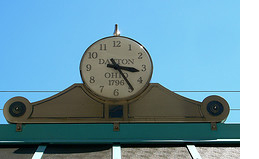
A cyber-physical system consists of two interacting subsystems, a cyber-system and a physical system. The behavior of the cyber system is controlled by the execution of programs on a distributed digital computer system, while the laws of physics control the behavior of the physical system. The different models of time—dense physical time in the physical system versus discrete execution time in the cyber system, and the impossibility of perfect synchronization of the physical clocks of the nodes of a distributed computer system, lead to interesting phenomena concerning the joint behavior of these two subsystems. The colloquium is intended to shed light on these phenomena by renowned scientists who have worked on this topic from different perspectives.
This group is for planning the National Workshop on the New Clockwork for Time-Critical Systems which is to occur in October in the Washington, D.C. area. Access to the workshop web page is restricted. If you have been invited to the planning meeting, please either log in or request an account.
On June 11 and 12, 2012, we held a planning meeting for the October workshop. The program agenda and slide presentations can be found here.
The rest of the page below this point is obsolete.
The planning meeting is expected to result in the formation of an organization committee, a list of questions and topics, and an outline for the structure and technical agenda of the workshop.
In preparation for the planning meeting, government organizers are expected to contribute a list of topics of interest to the Government. For example, the workshop may consider NTP, RCCs, time-triggered architectures, event-triggered architectures, PALS, GALS, LET, elastic scheduling, delay-tolerant systems, various other scheduling principles. A list of example technical problems would also be helpful, to seed the discussion, with the aim of drawing out others. For instance, the planning meeting might consider heterogeneous degrees of temporal resolution and coherence for time-referenced distributed events; wireless connectivity, mobility, and temporal consensus challenges; distance and relativity; failures, fault tolerance, and temporal correctness.
As background and a starting basis for the planning meeting, the organizers will suggest a few background readings. If participants read the papers before the meeting, there will be less need to spend time on formal presentations.
Who
~25 attendees from government, industry and academia. This event is by invitation only.
When
The agenda has been finalized. Please see the list of questions for attendees.
- Monday, June 11, 07:45 - Continental Breakfast, then start at 8:30 and go until 18:00 (Lunch provided, Dinner on your own)
- Tuesday, June 12, 07:45 - Continental Breakfast, then start at 8:30 and go until 12:00 (Lunch optionally available)
Where
Holiday Inn Dayton Fairborn
2800 Presidential Drive Fairborn, OH 45324
(Dayton, Ohio)
The planning meeting will be overlap somwhat with S5.
The block of conference rate rooms at the Holiday Inn Dayton/Fairborn is no longer available. If you have not yet booked your room, please do so through the hotel website.
Speakers
The purpose of the Dayton meeting is to have a forward looking discussion of the agenda (and related) topics in sufficient depth and breadth that the attendees can craft a call for papers for the workshop to be held October 25-26, 2012 in the Washington, DC area.
The talks are to focus on the future - what problems remain, new avenues, ways technologies complement each other, vulnerabilities, etc and NOT just a survey of current technology or simply a promotion of one technology. See the National Workshop on the New Clockwork for Time-Critical Systems page for background text.
Speakers should focus on the key issues (e.g. response to timing failures) for each topic and identify issues that require new research focus. Background material should be limited to that needed to understand the issues and new research requirements. The assumption is that most planning attendees will be generally familiar with most of the topics.
To this end we ask you to make your presentation as forward looking as possible and to identify issues needing future research and development. You should allow time at the end of your presentation for discussion and we encourage you to invite discussion from attendees. We hope for an expansive discussion that uncovers new ideas rather than a recitation of current thinking.
We also request that each of you generate a list of up to 5 questions related to the subject of your presentation for attendees to think about in preparation for the meeting. These questions will be sent to all attendees. The questions should be sent to Christopher Brooks at cxh@EECS.Berkeley.EDU no later than Friday, May 17, 2012.
Travel Reimbursements
The workshop will reimburse travel expenses for university-based attendees. To receive a reimbursement, travel expenses must follow the UC Berkeley Travel Policy (basically, no business class airfare, there are limits on meal expenses, no alcohol expenses will be reimbursed). To receive a reimbursement:
- The traveler will need to be added to UC Berkeley's vendor system, which requires a Social Security Number (SSN). At the meeting, Christopher Brooks will provide a paper form. Please do not email your SSN.
- After travel is completed, each traveler will fill out a UC Berkeley Travel Reimbursement Form, scan in receipts as pdf files and email it all to Christopher <cxh@eecs.berkeley.edu>.
- Assuming the expenses follow the travel policy, a check will be cut.
Air Travel
There is no shuttle between the airport and the hotel, you must rent a car or take a taxi.
Closest airports are
- Dayton (DAY) - 30 minutes by rental car
- Columbus (CMH) - 1 hour, 17 minutes by rental car
More news to follow.
Contact Christopher Brooks <cxh@eecs.berkeley.edu> for details. (Last updated May 15, 2012)
Photo Credit: Ross Griff
Banner Photo Credit: GollyGForce